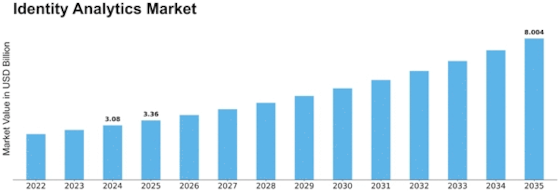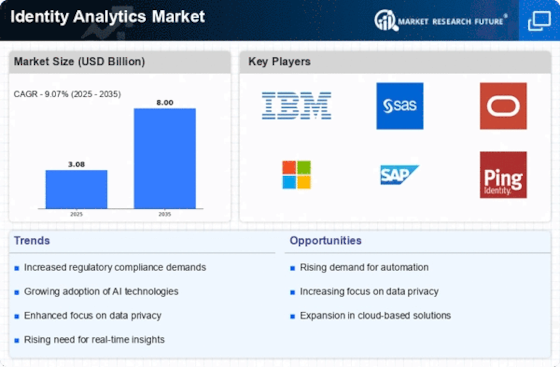Identity Analytics Size
Identity Analytics Market Growth Projections and Opportunities
In the dynamic landscape of Identity Analytics, market share positioning strategies play a pivotal role in determining the success of businesses. Identity Analytics refers to the process of analyzing and managing the digital identities of individuals within an organization. As the demand for identity management solutions continues to rise, companies operating in this space employ various strategies to carve out their niche and gain a competitive edge.
One prevalent strategy is differentiation, where companies focus on offering unique features or capabilities that set them apart from competitors. This might involve developing advanced analytics algorithms, incorporating cutting-edge technologies, or providing seamless integration with other security solutions. By emphasizing these distinctive attributes, companies seek to attract customers looking for specific functionalities that address their unique identity management needs.
Another key strategy is cost leadership, where companies aim to become the most cost-effective solution in the market. This involves optimizing internal processes, streamlining operations, and leveraging economies of scale to provide Identity Analytics solutions at a lower price point than competitors. Cost leadership can be particularly effective in attracting price-sensitive customers and gaining a larger market share, especially in industries where budget constraints are a significant consideration.
Companies also employ a focus strategy, concentrating on serving a specific market segment or niche within the broader Identity Analytics market. This might involve tailoring solutions to meet the needs of a particular industry, such as finance or healthcare, or focusing on organizations of a certain size. By becoming specialists in a specific area, companies can deepen their understanding of customer requirements and deliver more targeted solutions, ultimately strengthening their market position.
Collaboration and partnerships are increasingly becoming integral components of market share positioning strategies in the Identity Analytics space. Companies often seek strategic alliances with other technology providers, integrators, or industry experts to enhance their product offerings and expand their reach. By forming strong partnerships, companies can leverage each other's strengths and provide customers with comprehensive solutions that address a broader range of identity management challenges.
Furthermore, customer-centric strategies play a crucial role in market share positioning within the Identity Analytics Market. This involves understanding customer needs and preferences, gathering feedback, and continually improving products and services to meet evolving requirements. A customer-centric approach not only fosters loyalty but also helps in attracting new customers through positive word-of-mouth and testimonials.
In conclusion, the Identity Analytics Market is highly competitive, and companies employ a variety of market share positioning strategies to thrive in this dynamic environment. Whether through differentiation, cost leadership, focus, collaboration, or a customer-centric approach, successful companies navigate the complex landscape by adapting and evolving to meet the ever-changing demands of their customers. As the importance of identity management continues to grow in the digital era, strategic positioning will remain a critical factor in determining which companies emerge as leaders in this evolving market.



















Leave a Comment